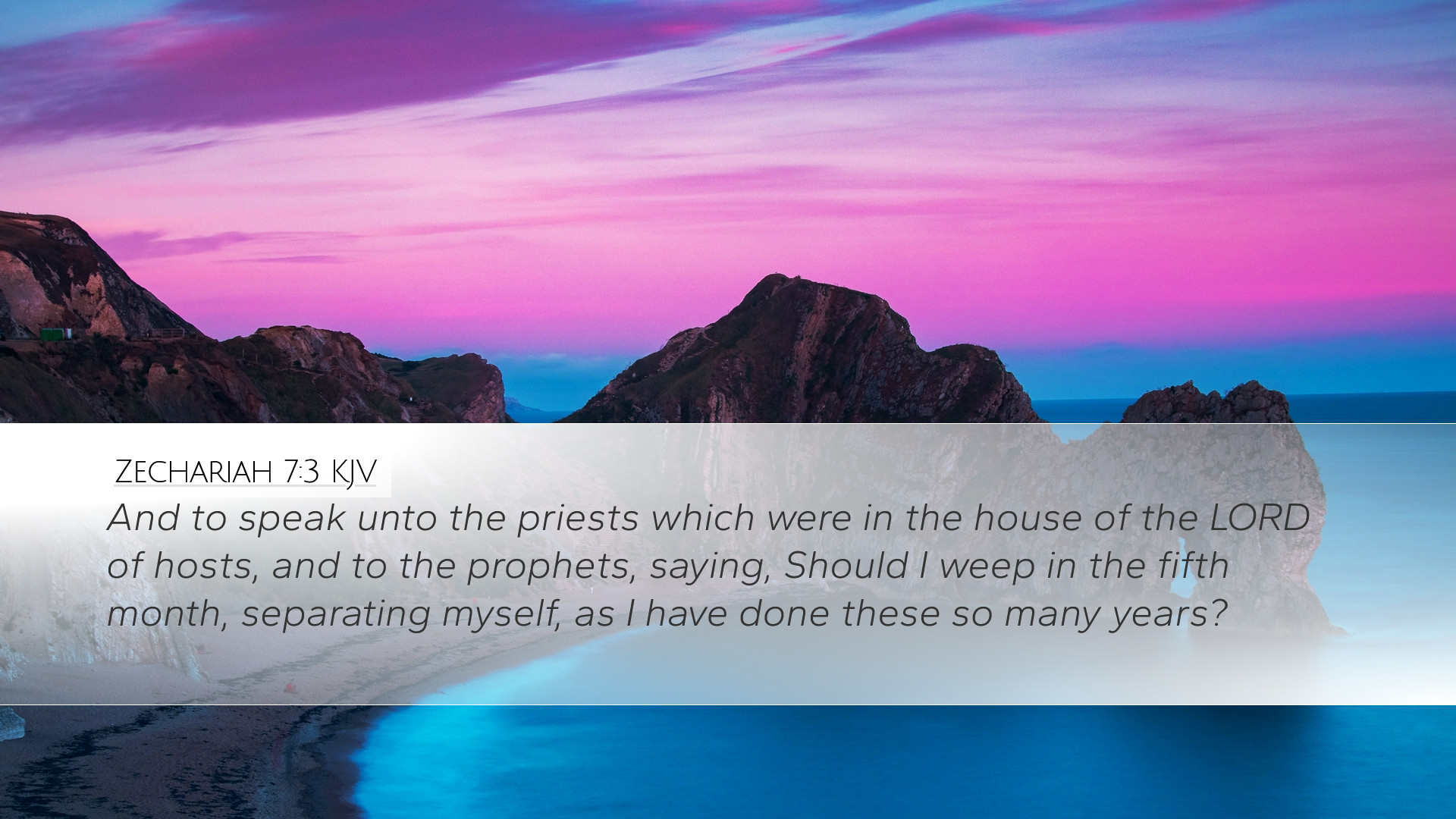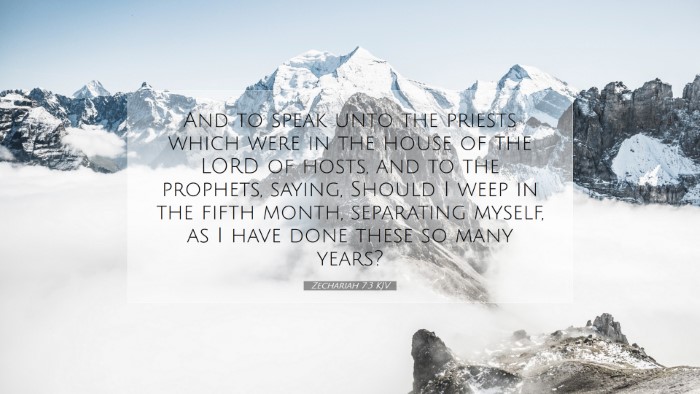Old Testament
Genesis Exodus Leviticus Numbers Deuteronomy Joshua Judges Ruth 1 Samuel 2 Samuel 1 Kings 2 Kings 1 Chronicles 2 Chronicles Ezra Nehemiah Esther Job Psalms Proverbs Ecclesiastes Song of Solomon Isaiah Jeremiah Lamentations Ezekiel Daniel Hosea Joel Amos Obadiah Jonah Micah Nahum Habakkuk Zephaniah Haggai Zechariah MalachiZechariah 7:3
Zechariah 7:3 KJV
And to speak unto the priests which were in the house of the LORD of hosts, and to the prophets, saying, Should I weep in the fifth month, separating myself, as I have done these so many years?
Zechariah 7:3 Bible Commentary
Commentary on Zechariah 7:3
Verse: Zechariah 7:3 - "And to speak unto the priests which were in the house of the Lord of hosts, and to the prophets, saying, Should I weep in the fifth month, separating myself, as I have done these so many years?"
Introduction
This verse occurs in the context of a message given to the people of Israel regarding their mourning practices and the authenticity of their worship. Zechariah, a prophet of Yahweh, captures a moment of inquiry about the appropriateness of their traditional expressions of grief and devotion.
Context and Background
The historical setting of Zechariah's ministry is significant. Following the Babylonian exile, the Jewish people returned to Jerusalem with the desire to rebuild the temple and restore their community. During this time, a question arose about the relevance of their mourning rituals.
- Perennial Mourning: The fifth month marks a significant period of mourning for the Israelites, particularly the destruction of the First Temple. This serves as a background for their practices.
- Religious Authority: The priests and prophets are called upon to give guidance regarding these observances, showing the importance of spiritual leadership in interpreting tradition.
Analysis of the Text
In this verse, the inquiry made by the people reflects a deeper consideration of the nature of their worship and the commands of God. The hesitation about mourning suggests a search for relevance in their current spiritual practices.
Priests and Prophets' Role
According to Matthew Henry, the priests and prophets hold a dual role of teaching and guiding the community in their understanding of God’s law and commands. Their responsibility includes interpreting the significance of rituals, particularly during significant historical commemorations.
Emotions in Worship
Albert Barnes emphasizes that while mourning is a legitimate emotional response, it is crucial to evaluate the heart behind the action. Should the rituals continue if they do not stem from genuine need or revelation? This invites a deeper reflection on whether their practices align with divine expectation.
Tradition vs. Revelation
Adam Clarke discusses the tension between maintaining tradition and receiving new revelation from God. The question posed indicates a transition from their past focus on mourning towards a potential renewal of hope and future restoration, ultimately leading to a more profound understanding of God’s redemptive plan.
Theological Implications
This verse opens discussions on several theological themes pertinent for pastors and scholars alike:
- Liturgical Relevance: How do cultural and historical contexts shape liturgical practices? The ongoing relevance of communal mourning raises questions about adapting spiritual practices to current realities.
- Spiritual Renewal: The inquiry into whether to weep or not signals a potential transition to spiritual renewal, a theme echoed throughout the prophetic literature.
- God’s Desire for Authentic Worship: A critical message resonates that God desires authenticity in the hearts of His people more than mere ritual observance.
Concluding Thoughts
In conclusion, Zechariah 7:3 presents an invitation to reconsider the significance of worship practices amidst a changing cultural landscape. The exchange between the people and spiritual leaders highlights the need for reflection on past traditions while seeking to align with God’s present will.
This verse reminds us that as practitioners of faith, we must continually assess our outward expressions in light of our inward realities—always seeking to bring God true worship from the depths of our hearts.


